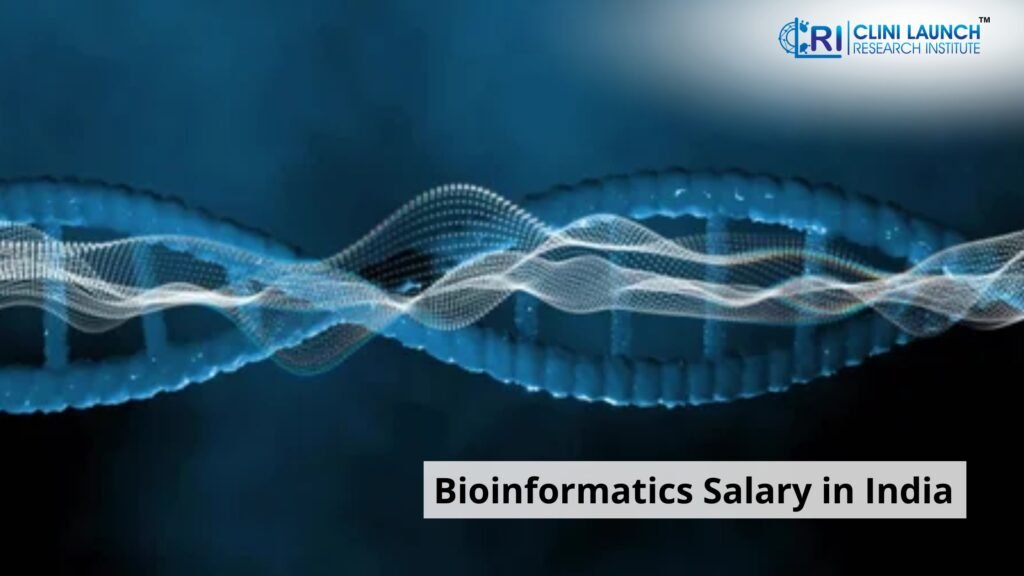Bioinformatics is a multidisciplinary field combining statistics, biology, computer science, engineering, and mathematics to analyze and decipher biological data. Now, is bioinformatics a good career in 2024? Yes, it is one of the most promising and rapidly evolving career fields in science and technology. It has applications in various domains such as health care, agriculture, biotechnology, environment, forensics, etc.
But is bioinformatics a promising career in India? What are the opportunities and challenges for bioinformatics professionals in the Indian context? How can one pursue a successful career in bioinformatics in India, or does bioinformatics have a future? This blog will answer these questions and provide valuable tips and resources for aspiring bioinformaticians.
Is Bioinformatics a good career in 2024?

India has a massive potential for bioinformatics, as it has a large pool of talented and skilled professionals, a rich biodiversity, a growing biotechnology sector and a supportive government policy. Now, “Is bioinformatics a good career in 2024?” The answer is yes, which is based on Grand View Research. The global market size of bioinformatics was explicitly valued at $8.6 billion in 2019, with an expected growth of 13.4% CAGR from 2020-27. India is one of the key players in this market, with a CAGR of 14.9% from 2019 to 2025.
Want to Learn Bioinformatics for your Career Growth! Register Now.
Some of the factors that contribute to the growth of bioinformatics in India are:
- The increasing demand for personalized and precision medicine requires analyzing genomic and proteomic data to provide tailored treatments for patients.
- The rising prevalence of chronic diseases such as cancer, diabetes, cardiovascular diseases and infectious diseases requires the development of new drugs and diagnostics based on molecular data.
- The advancement of next-generation sequencing (NGS) technologies, which generate massive amounts of data that need to be stored, processed and analyzed using bioinformatics tools and techniques.
- The emergence of big data analytics, artificial intelligence (AI) and machine learning (ML) enables the extraction of meaningful insights from complex and heterogeneous biological data.
- The availability of online courses, platforms and resources that provide easy access to bioinformatics education and training for students and professionals.
Some of the areas where bioinformatics has a significant impact in India are:
- Healthcare: Bioinformatics plays a vital role in improving the quality and efficiency of healthcare delivery by enabling the discovery of new biomarkers, drug targets, therapies and diagnostics. It also helps in understanding the genetic basis of diseases, identifying disease susceptibility and predicting treatment outcomes. Healthcare is the best area that significantly impacts Indian culture. It is one of the best sectors where you will find the answer to “Is bioinformatics a good career in 2024?” Bioinformatics can also facilitate the integration of clinical data with genomic data to provide personalized medicine and precision medicine solutions.
- Agriculture: Bioinformatics can help in enhancing the productivity and sustainability of agriculture by enabling the development of improved crops and livestock with desirable traits such as disease resistance, drought tolerance, pest resistance, nutrient efficiency and yield. Pursuing a course for MSc bioinformatics jobs can also help understand the molecular mechanisms of plant growth and development, stress responses and adaptation. Bioinformatics can also assist in conserving and managing biodiversity and bioresearches by providing tools for identifying, classifying and characterizing species..
- Biotechnology: Bioinformatics can support the innovation and growth of biotechnology by enabling the design and engineering of novel biological systems such as enzymes, proteins, vaccines, antibodies and biosensors. It can also help optimize biotechnology products’ production processes and quality control. So, here is the query answer to “does bioinformatics have a future? Bioinformatics can also facilitate the development of synthetic biology and biofuels by providing tools for the modelling, simulation and analysis of biological networks and pathways.
- Environment: Bioinformatics can contribute to the protection and restoration of the environment by enabling the monitoring and assessment of environmental quality, pollution and contamination. It can also help in understanding the impact of climate change on ecosystems and biodiversity jobs after MSc bioinformatics. It will support the development of bioremediation strategies by providing tools for identifying and manipulating microorganisms that can degrade or detoxify environmental pollutants.
Jobs After MSc Bioinformatics

Bioinformatics offers multiple career opportunities for students and professionals passionate about biology and computer science. Bioinformatics professionals can do MSc bioinformatics jobs in various sectors such as academia, research institutes, industry, government organizations, hospitals, pharmaceuticals etc.
Want to Learn Bioinformatics for your Career Growth! Register Now.
These are some of the popular job roles in the field of bioinformatics:
- Bioinformatics Analyst: A bioinformatics analyst is responsible for collecting, processing, analyzing and interpreting biological data using various tools and software. The bioinformatics analyst may also develop new algorithms or pipelines for data analysis. A bioinformatics analyst may work on different data types, such as genomic, transcriptomic, proteomic, etc.
- Bioinformatician: A bioinformatician is a person who applies bioinformatics methods and techniques to solve biological problems or answer biological questions. The BSc bioinformatics jobs may be involved in research projects on genomics, proteomics, metabolomics, etc. A bioinformatician may also design and implement new bioinformatics solutions or systems.
- Bio-Statistician: A bio-statistician is a person who applies statistical methods, models to analyze biological data. may also perform statistical tests or experiments to validate or verify biological hypotheses or results. A bio-statistician may work on various data types, such as clinical and epidemiological data.
- Medical Coder: A medical coder is a person who assigns codes to medical records or documents using standardized coding systems such as ICD-10 or CPT, and may also review or audit medical records or documents for accuracy or compliance. A medical coder may work for hospitals, clinics or insurance companies.
- Bioinformatics Research Associate: A bioinformatics research associate is a person who assists or supports a senior researcher or scientist in conducting bioinformatics research projects. This is the job role which comes under jobs after MSc bioinformatics where bioinformatics research associate may collect data, process, analysis, visualization, report, etc.
- Technology Manager: A technology manager is a person who manages or oversees the development, implementation, maintenance, and improvement of bioinformatics technologies or systems. A technology manager may also coordinate or supervise the work of other bioinformatics professionals or teams.
Bioinformatics Salary in India

The salary of a bioinformatician depends on various factors such as qualification, experience, skills, location, sector etc. According to Payscale.com, the average wage for a career in bioinformatics in India are INR 5.8 lakh per annum.
However, the salary range of some typical job roles for bioinformaticians are:
- BSc bioinformatics jobs for Bioinformatics Analyst: INR 3 lakh – INR 8 lakh per annum
- Bioinformatician: INR 4 lakh – INR 10 lakh per annum
- Bio-Statistician: INR 4 lakh – INR 12 lakh per annum
- Medical Coder: INR 2 lakh – INR 6 lakh per annum
- Bioinformatics Research Associate: INR 3 lakh – INR 7 lakh per annum
- Technology Manager: INR 6 lakh – INR 18 lakh per annum
How to Pursue a Career in Bioinformatics in India

To pursue a career in bioinformatics in India, one must have a strong biology and computer science background. One must also have good analytical, problem-solving, communication, and teamwork skills.
However, various academic courses are available at different levels for BSc bioinformatics jobs. So, these are the academic certification courses that will help you achieve your career goals in the field of Bioinformatics:
- Certificate Course in Bioinformatics: This short-term course introduces basic concepts and applications based on the question “Is Bioinformatics a good career in India“. The course duration may vary from six months to one year. The eligibility criteria for this course is usually class 12th pass with science subjects. Some institutes that offer this course are IGNOU, Amity University etc.
- Diploma Course in Bioinformatics: This intermediate-level course provides an overview of various topics and techniques related to bioinformatics. The duration of this course may vary from one year to two years. The eligibility criteria for this course are usually a class 12th pass with science subjects or graduation with relevant topics. Bharathiar University, University Of Madras, and other institutes that offer this course to make a meaningful BSc bioinformatics jobs.
- PG Diploma Course in Bioinformatics: This advanced-level course provides in-depth knowledge and training on various aspects and applications of bioinformatics. The duration for this course is usually one year. The eligibility criteria for this course are traditionally graduation with relevant subjects or post-graduation with relevant subjects. Some institutes that offer this course are IIT Delhi, University Of Hyderabad etc. You can apply for the jobs after MSc Bioinformatics to advance your career prospect.
- BSc Bioinformatics: This undergraduate-level course provides a comprehensive education on various domains and disciplines related to bioinformatics. The course duration of BSc Bioinformatics is usually three years. The eligibility criteria for this course is usually class 12th pass with science subjects with physics, chemistry, biology, and mathematics as compulsory subjects. Some institutes that offer this course are VIT Vellore, BHU etc. After this you can apply for the BSc bioinformatics jobs course.
- BTech Bioinformatics: This undergraduate-level course provides professional education on various engineering aspects and applications related to bioinformatics. The duration of this course is usually four years. The eligibility criteria for this course is usually class 12th pass with science subjects with physics, chemistry, and mathematics as compulsory subjects and biology/biotechnology/computer science as optional subjects. Some institutes that offer this course are SRM University Chennai, Amity University etc.
- MSc Bioinformatics: This postgraduate-level course provides a specialized education on various aspects and applications of bioinformatics. Usually, the course duration of MSc Bioinformatics is two years. The duration of this course is usually two years. The eligibility criteria for this course are traditionally graduation with relevant subjects or post-graduation with relevant subjects. Some institutes that offer this course are IIT Delhi, JNU, BHU etc. After your course completion, you can get an MSc. Bioinformatics Jobs by applying for the CliniLaunch career fair programs.
- PhD Bioinformatics: This doctoral-level course provides an opportunity for original research and contribution to bioinformatics. The duration of this course may vary from three to five years. The eligibility criteria for this course are usually post-graduation with relevant subjects and a valid score in an entrance exam such as GATE, JEST, BINC etc. Some institutes that offer this course are IISc Bangalore, IIT Bombay, IIT Madras etc.
Besides these academic courses, various online courses and platforms provide bioinformatics education and training for students and professionals. Some of them are:
- Coursera: Coursera is a popular online learning platform that offers various courses and specializations in bioinformatics from reputed universities and institutions such as Johns Hopkins University, University of California San Diego, University of Toronto etc. Some courses include Bioinformatics Specialization, Genomic Data Science Specialization, Bioinformatics: Introduction and Methods, etc.
- edX: edX is another online learning platform that offers various classes and programs in bioinformatics from renowned universities and organizations such as Harvard University, MIT, IBM etc. Some of the courses are Introduction to Bioconductor: Annotation and Analysis of Genomes and Genomic Assays, Data Analysis for Life Sciences, Computational Biology: Genomes, Networks, Evolution etc.
- NPTEL: NPTEL is an initiative by the Indian Institutes of Technology (IITs) and the Indian Institute of Science (IISc) that provides online courses and certification in various domains, including bioinformatics. Some studies are Introduction to Bioinformatics, Computational Systems Biology, and Computational Molecular Biology.
Bioinformatics Skills Required in India

To pursue a career or get jobs after MSc bioinformatics in India, one must have a strong biology and computer science background. One must also have good analytical, problem-solving, communication and teamwork skills.
Some of the specific skills required for bioinformaticians are:
- Programming Skills: Programming skills are essential for bioinformaticians to write code to develop or use bioinformatics tools and software. Some popular programming languages used in bioinformatics are Python, R, Perl, Java, C++, MATLAB, etc.
- Database Skills: Database skills are essential for bioinformaticians as they need to store, retrieve and manipulate biological data using various database systems such as MySQL, Oracle, MongoDB etc.
- Statistical Skills: Statistical skills are crucial for bioinformaticians to apply statistical methods and models to analyze biological data. Some statistical tools used in bioinformatics are SPSS, SAS, Stata, etc. which will help you in Jobs after MSc bioinformatics for your career expansion.
- Machine Learning Skills: Machine learning skills are helpful for bioinformaticians as they need to use machine learning techniques such as supervised learning, unsupervised learning, deep learning etc., to extract patterns and insights from biological data. Some machine learning tools used in BSc bioinformatics Jobs are TensorFlow, PyTorch, Scikit-learn etc.
- Domain Knowledge: Domain knowledge is necessary as you need to have a good understanding of the biological concepts and principles related to area of interest, such as genomics, proteomics, metabolomics etc.
Bioinformatics Career Tips for India
To pursue a successful career in bioinformatics in India for MSc bioinformatics jobs in Bangalore, one needs to follow some tips and strategies such as:
- Choose the right course: Choosing the right approach is essential for aspiring bioinformaticians as it will provide them with the required knowledge and skills for their career goals for BSc . When selecting a course, one should consider factors such as eligibility criteria, course curriculum, faculty, placement opportunities, fees etc., while setting a course. One should also explore online courses and platforms offering bioinformatics education and training.
- Build a portfolio: It is essential for bioinformaticians as it will showcase their projects and achievements to potential employers or clients. One should include examples of their work, such as code snippets, data analysis reports, visualizations, publications etc., in their portfolio to get jobs after MSc bioinformatics for your career growth and expansion. One should also update their portfolio regularly with new projects or skills.
- Network with peers: Networking with peers is beneficial for bioinformaticians as it will help them to learn from others, exchange ideas, find mentors, seek feedback, discover opportunities etc. You must join various online communities and forums related to BSc bioinformatics Jobs, such as Biostars, SEQanswers, Reddit etc. One should also attend various events and workshops related to bioinformatics, such as conferences, seminars, hackathons etc.
- Keep learning: Keeping learning is vital for bioinformaticians as it will help them stay updated with the latest trends and developments in MSc bioinformatics jobs. One should read various blogs, journals, books, podcasts etc., related to bioinformatics, such as Bioinformatics Review, Nature Biotechnology, bioinformatics.org etc. One should also take up various online courses and certifications related to bioinformatics, such as Coursera, edX, NPTEL etc.
Conclusion
In conclusion, why it is bioinformatics a good career in 2024, as it offers many opportunities and challenges for students and professionals passionate about biology and computer science. Bioinformatics can help solve various problems and answer multiple questions related to health care, agriculture, biotechnology, the environment and more.
To pursue a career in bioinformatics, you need to ask yourself first that does bioinformatics have a future in India, you need to have a strong background in biology and computer science. One must also have good analytical, problem-solving, communication and teamwork skills. One can pursue various academic courses at different levels or online courses and platforms that provide bioinformatics education and training.
Bioinformatics offer a wide range of career opportunities for students and professionals in various sectors such as academia, research institutes, industry, government organizations, hospitals, pharmaceutical etc. for the professionals who does MSc Bioinformatics jobs. Bioinformatics professionals can earn anywhere between INR 2.5 Lakh – INR 10 Lakh per annum depending on their qualifications, experience, skills, location, and sector.
Does bioinformatics have a future means to be a promising and exciting field that can help improve the quality and efficiency of life sciences and biotechnology. Bioinformaticians can transform raw and unstructured data into valuable insights and predictions by following a systematic and rigorous process.
If you are interested in learning bioinformatics for any kind of career in bioinformatics such as BSc bioinformatics jobs and know how it will benefit your career or business, register at our website: www.clinilaunchresearch.in.






This webpage is fabulous. The superb information shows the maker’s earnestness. I’m dazed and envision additional such incredible presents on.
Usually I do not read article on blogs however I would like to say that this writeup very compelled me to take a look at and do so Your writing taste has been amazed me Thanks quite nice post
Fine way off describing, and nice post to get facts about my presentation focus, which I am going to convey in university. https://www.waste-ndc.pro/community/profile/tressa79906983/
Is Bioinformatics a Good Career in 2024: A Thriving Field
[url=https://www.g3ih8954gth621a283a9ugdye5iz827as.org/]ulieegxmycb[/url]
lieegxmycb https://www.g3ih8954gth621a283a9ugdye5iz827as.org/
alieegxmycb
Your posts in this blog really shine! Glad to gain some new insights, which I happen to also cover on my page. Feel free to visit my webpage about Domains and any tip from you will be much apreciated.
Thanks for sharing. I read many of your blog posts, cool, your blog is very good.
Thank you for your sharing. I am worried that I lack creative ideas. It is your article that makes me full of hope. Thank you. But, I have a question, can you help me? https://accounts.binance.com/en-IN/register?ref=UM6SMJM3
I truly value your method of writing blogs. I’ve saved it to my bookmarks and will check back later
Extremely valuable articles or reviews currently